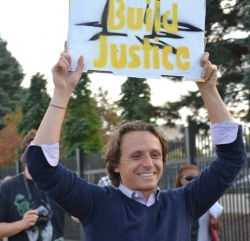Jun
19
2014

Written by Aaron Handelsman
What does it mean when even after a last-minute venue change over 100 overworked community activists across seven city council districts turn out to an event committed to bringing about social change? I think it means a movement is building.
Tuesday, June 12th marked the second annual meeting of the Detroit People’s Platform (PP). The PP is a citywide organizing effort designed to raise awareness and shift the narrative around five key social justice issues: land justice, transportation justice, food justice, good governance, and good jobs. In light of disappearing access to basic human rights like water for the least privileged among us, attendees at the meeting also voted to expand the Platform by adding Poverty & Inequality as a sixth “plank.” The Detroit Center for Community Advancement will be working with the People’s Platform to roll out a campaign on that issue in the second half of 2014.
Tuesday’s meeting was about more than accountability and reporting out. It stood as a testament to the collaborative nature and group ownership of the Platform. When the organizers had to change the venue the day before the scheduled event, BMP Detroit allies at the Capuchin Soup Kitchen agreed to host the meeting of residents and social justice advocates.
The support of the Capuchins, as well as neighborhood block clubs, Citizens District Council members, and advocates for welfare rights reflects the power of the service and social change work BMP Detroit has been engaged in for the past 13 years. The Capuchins of Detroit were one of the sites where Linda Campbell pioneered her work to support and counsel service providers in shifting from a framework of charity, towards one of social change and transformation. The lessons gained from her work with Detroit groups like the Capuchins was formalized in the Process Guide and eventually spread to other organizations in Detroit and beyond.
One of the other major lessons of Linda’s 13 years of building the service and social change model is that the work happens through relationships. The People’s Platform is creating a shared space, both physically and philosophically, for existing relationships to deepen and for new relationships to develop. Several participants commented, “It’s so great to see so many people I know who I never get to see all at once. It’s like a family reunion – without the baggage and awkward, alcoholic uncle!”
The evening’s “reunion” committed a large portion of the agenda to district-level conversation. During this period, district leaders and residents spent time discussing how the work on the various planks moved forward—or didn’t—in their districts. They looked at what worked well and what didn’t, and identified which two areas they thought deserved special attention in 2014. Representatives then reported out to the whole group.
Issues around land justice – particularly the rights of people to secure land tenure, permanent affordable housing, and space to grow food – received special attention across the districts. Understanding that who controls the land lies at the core of both the problems and solutions to many of Detroit’s most pressing issues, a number of PP members committed to join the growing Community Land Trust (CLT) Coalition. CLTs, which originated in rural Georgia during the Civil Rights Movement, can be used to shift our relationship to the land away from market speculation and commodification, and instead toward community economic power, stability, and stewardship.
Participants were also energized by the pressing issue of establishing local Community Advisory Councils (CACs). CACs would create an opportunity to elect local residents to serve as intermediaries between their neighbors and elected district council members. This would give voice to grassroots groups on the issues they deem most pressing, because council members are required to meet with established CACs regularly. While these CAC representatives can bring a greater degree of accountability to the world of electoral politics in Detroit, each district needs to establish its CAC first. And because the deadline to establish CACs is July 20th, this endeavor will require a fast, coordinated effort around collecting signatures and educating residents. That is exactly what a number of PP members committed to doing on Tuesday, in collaboration with an existing citywide effort.
While much work remains, the People’s Platform continues to build power across districts and create a space for residents and allies to come together to address the most pressing community needs from a systems change perspective.
